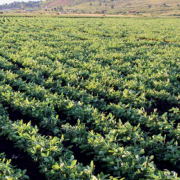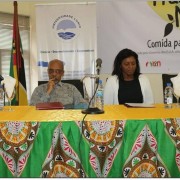Speeches Shim

Agriculture is the backbone of Mozambique’s economy. More than 80% of Mozambicans are employed in the agricultural sector with 90% of those being women. Therefore, accelerating agricultural growth is a key means of eradicating poverty and increasing food security in rural areas where poverty is widespread.The crops targeted by this activity (common bean, cowpea, groundnuts, pigeon pea and soybean) are the foundation of Mozambique’s food and nutrition security and a source of income for many smallholder farmers. Nevertheless, the competitiveness and profitability of most smallholder legume and sesame farmers are constrained by low productivity due to limited access to improved varieties and outdated agronomic practices.

December 18, 2019 – Nampula City. The U.S. Government officially launched yesterday the Transform Nutrition and Advancing Nutrition projects. The U.S. Government was represented at the event by United States Agency for International Development (USAID) Health Office Director Monique Mosolf, while Nampula Governor Victor Manuel Borges represented the Government of the Republic of Mozambique.
On December 9, the Board of Directors of the Millennium Challenge Corporation (MCC) selected Mozambique for development of a second compact. U.S. Ambassador Dennis W. Hearne and MCC Chief Executive Officer Sean Cairncross informed President Filipe Jacinto Nyusi of Mozambique’s selection during a telephone call that same day. Together with the United States Government’s nearly $500 million in current annual development assistance, Mozambique’s selection for a second compact further reinforces our commitment to partner with Mozambique to promote more inclusive economic growth and political reforms that strengthen the rule of law and democracy.
The governments of the Republic of Mozambique and the United States held a ceremony today to celebrate five years of achievement in the fight to end tuberculosis (TB). At the ceremony, the U.S. Agency for International Development (USAID) Mission Director for Mozambique, Dr. Jennifer Adams, and Minister of Health, Dr. Nazira Abdula, signed a “Strategic Partnership Statement to Improve Tuberculosis Control.” This partnership seeks to end TB and ensure Mozambicans affected by TB live healthy and productive lives.
Mozambique´s abundant natural resources and geography create both opportunities and risks. The exploitation of oil, gas and minerals as well as biodiversity, such as wildlife, fisheries and forests, help to promote economic growth but when conducted unsustainably, fuel corruption and often lead to resource conflict. The long coastline and extensive borders serve as a commercial gateway to six countries and transcontinental trade routes. Gorongosa National Park and the vast Niassa National Reserve are fragile refuge areas for lions, elephants and other endangered species threatened by rampant poaching for bush meat and wildlife trafficking. Low-lying coastal plains cover nearly half of the land mass leaving large parts of the country vulnerable to cyclones and extreme flooding, including important population, commerce and trade centers.


Comment
Make a general inquiry or suggest an improvement.